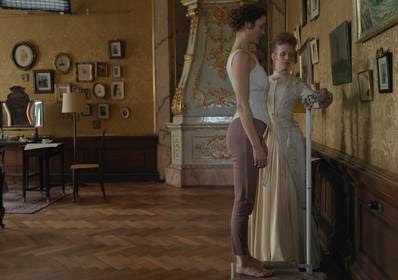It's nevertheless a risky proposition to be setting out as cinema patrons negotiate a real-world cost-of-living crisis. Kreutzer's response would doubtless be that her Sisi feels bad in large part because she has it so good, that her tristesse is disproportionate. (She's unhappy because she knows she has no material reason to feel unhappy.) I couldn't quite see the fascination Krieps inspired in 2017's Phantom Thread - she struck this eye as a pallid slip of a thing - which is one reason that film inspired less obsession in me than it plainly did in many others. Here, with Monika Buttinger's costuming bulking her out and lending sporadic hints of colour to her cheeks, she's a good deal more persuasive. This Sisi is above all else a grown woman, with kids adding to her angst; it's just she's also grown weary, washed-out and waning, all of which fall comfortably within the Krieps wheelhouse. Previous screen Empresses - your Garbos and Dietriches - have been aspirational figures, pin-ups de luxe; Krieps, by contrast, presents as the relatable postergirl for a vastly more strung out, neurotic era. She could be any frazzled hausfrau in modern Vienna - except Kreutzer makes an insistent big deal of the moneyed ennui and lassitude her Sisi has married into: the days when there's nothing to do except go riding (and even less when your horse gets shot), the rooms so cavernous that every footstep across them sounds like a hammer blow to the brain. It's scarcely a surprise when heroin - a replacement horse - enters this picture, metabolised to the strains of "Für Elise". There's a price to pay for this level of status, Kreutzer maintains, and it may just be going out of your mind with boredom.
This is not at all, then, costume drama of the Downton or Crown variety: we feel for Kreutzer's heroine, but largely because the institutions she's ghosting around within are shown as so absurd and limiting - antiquated even for 1898. Krieps's Sisi could be a sister to Elle Fanning's Catherine on TV's The Great - a moderniser driven to exasperation by the hidebound tradition she's been invited and essentially employed to maintain - except that, unlike the forthright Catherine, slyly carving wiggle room at court, Sisi is simply supposed to sit upright (hence the corsets) and suck it up. As is apparent from that opening image, she's been schooled - and has been schooling herself - not to breathe out too deeply or forcefully. She may finally emerge as closer in her lineage to Kristen Stewart's Diana in Spencer - and one notes the royals must have laboured hard to keep their women in such a stranglehold a hundred years after the events Corsage riffs on. Kreutzer can be a touch eccentric about making these points; the movie's crossover success is both heartening and slightly baffling. Though we hear Kris Kristofferson's "Help Me Make It Through the Night" being plucked out on the fiddle by one of Sisi's courtiers, it hardly counts as the full Sofia Coppola-Marie Antoinette or Luhrmann-Gatsby treatment, because the movie can't ever let itself go as those predecessors did. A fundamentally Teutonic proposition, it's not quite here for a good time; it, too, seems to be wearing a corset more often than not.
For one thing, after the sensationally pulsing headache of The Ground Beneath My Feet, Corsage feels far more drily academic in its conception. It's the kind of costume drama you might well end up with at the end of a year where Jeanne Dielmann... has been voted the greatest film of all time; a project informed by a half-century of theory by women in film about women in film. (In turn, it will inspire a dozen or more theses: you can already hear papers being rustled as Sisi and her female companion get matching tattoos, and footnotes being inserted during the lovely closing-credits sequence that finds Krieps-as-Sisi moving far more freely than before - and having to grow a moustache for the privilege.) The film's strengths come from a director thinking through her material and its latter-day implications; its weaknesses stem from directorial overthinking, which is still preferable to no thought whatsoever. Kreutzer wants us to share the boredom and frustration of a heroine who, unusually for a movie heroine, can't really find anything satisfying to do, and only ever feels anything whenever she's being laced into her underwear. We do share that, but it makes Corsage a somewhat perverse success, because for stretches we're also left bored, frustrated and numbed. Interesting, though, to observe a contemporary filmmaker using a heritage framework to ponder an enduring creative conundrum: how do you make a character come alive when their circumstances continually deny them everything one desires for a rewarding, well-rounded, enjoyable life?
Corsage is now playing in selected cinemas.

No comments:
Post a Comment